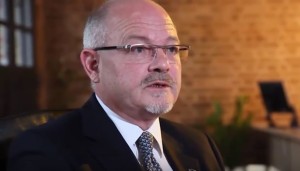 I was curious to hear about Euromax Resources' view of the road to final financing on the Ilovica copper-gold project in Macedonia, after the company released a no-big-surprises feasibility study this morning.
I was curious to hear about Euromax Resources' view of the road to final financing on the Ilovica copper-gold project in Macedonia, after the company released a no-big-surprises feasibility study this morning.
London-based Steve Sharpe, president and CEO, answered his phone and after some wrangling with Skype's poor quality, we chatted for 10 or so minutes about Euromax's coming year and prospects.
A final comment first. Sharpe, with a long history in banking and the mining sector, reflected that the current downturn in the mining reminded him of the 1990s. Indeed, a mirror image, particularly from an international perspective.
"It is exactly as it was in the early 1990s," he said. "Absolutely identical."
Sharpe acknowledges that Canada is a bit different than the rest of the world, with a more dedicated mining equity sector. But from his vantage point in London it's a similarly disinterested market. Now the FTSE 100 is replete with miners. "Ten years earlier they were nowhere to be seen," Sharpe said.
People growing up in the 2000s resources boom forget that.
"No one wanted to give you money," said Sharpe, who previously held leading roles in European Goldfields, sold to Eldorado Gold for its Greek assets, and Rothschild.
But back to current events.
Euromax, which is headed up by more or less the same team as European Goldfields, holds the Ilovica copper-gold asset in Macedonia. It's a moderate-scale porphyry deposit with reserves of 209mt @ 0.34 g/t Au and 0.2% Cu. Under Euromax's tenure, the project has advanced far with tentative financing agreements (debt and financing with potential for government guarantees on loans) and offtake.
It has now progressed to the feasibility stage, with economics looking favourable at assumed metal prices. Plan is for an open pit with a 1:1 strip ratio and throughput averaging 10 million tonnes a year over a 20-year mine-life. A copper-gold concentrate would be floated and a dore produced via carbon-in-leach. In terms of economics it boils down to a post-tax IRR of 17.8% at $1,220/oz gold and $2.90/lb Cu.
Obviously these metal prices are higher than present, representing Euromax's use of long-term forecasts by analysts. So is Sharpe worried banks will balk at the project with current prices for copper and gold depressed?
Sharpe isn't perturbed. In the run-up to the feasibility study Euromax has arranged a debt mandate for $215 million, a streaming deal worth $160 million (in tranches) and a $25-million equipment finance. Meantime, Euromax signed an agreement in principle for a German loan guarantee covering the debt portion of this financing to $240 million.
"It (the loan guarantee) means we can sustain really low copper and gold prices while still meeting our payments to the banks," Sharpe said.
Assuming no hiccups - and this will need to be carefully watched including the issuance of final permitting by Macedonia expected in July - Sharpe maintains the view that Euromax will break ground on Ilovica in September. Of course, the markets will remain skeptical of full financing until the debt comes through. But at a time like this in a beat-up junior sector, it will be considerable comfort to investors that Euromax is not banking on equity to build Ilovica.
For a $35-million marketcap junior on a near $500 million project to fund through equity would be impossible, laughable. Sharpe agrees.
"Strategically, and this is quite important, we're not reliant on the equity market," he said.





















